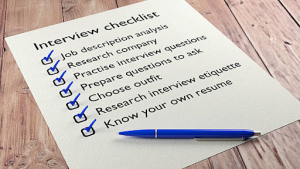
Interviews can be a nerve-wracking experience, especially if you are not sure what to expect. But, with preparation, you can ace the interview and increase your chances of landing the job. One key aspect of interview preparation is anticipating and practicing answers to common interview questions.
In this article, we will provide an overview of common interview questions asked for the latest Nigerian jobs, sample answers, the dos and don’ts of answering interview questions, and some additional resources for interview preparation.
Overview of Common Interview Questions in Nigeria
Although interview questions may vary depending on the industry, company, and position, there are some common questions that are often asked in job interviews in Nigeria. Here are some examples:
- “Tell me about yourself.”
- “What are your strengths?”
- “What are your weaknesses?”
- Why are you interested in working for this company?”
- “What are your long-term career goals?”
- “What experience do you have in this field?”
- “How do you handle stress or pressure?”
- “What salary are you expecting?”
Employers ask these questions to learn more about your skills, experience, and personality, as well as to assess your fit with the company culture and job requirements. Therefore, it is important to prepare thoughtful and honest answers that showcase your strengths and match the job description.
Sample Interview Questions and Answers For Latest Nigerian Jobs
To help you prepare for your next interview, here are some sample answers to common interview questions:
Q: Tell me about yourself.
“My name is Glory and I am a result-oriented marketing executive with over five years experience. I specialize in social media marketing and have worked on campaigns for various clients across different industries, including a popular e-commerce platform in Nigeria. In my free time, I enjoy reading and writing about user experience.
Q: What are your strengths?
“I believe my strengths are my creativity, attention to detail, and ability to work under pressure.” “In my previous roles, I have been able to come up with innovative marketing ideas, produce high-quality content, and meet tight deadlines.”
Q: What are your weaknesses?
“I’m not so good at public speaking and it is one thing I’m currently working on improving. Although I am confident in my writing and presentation skills, I sometimes get nervous when speaking in front of large groups. However, I have been taking public speaking classes and practicing with colleagues to overcome this challenge.”
Q: Why are you interested in working for this company?
I love that the company is user-centered and its mission statement excites me as I’m equally passionate about some of the things the company does. I believe my skills and experience align well with the job requirements and my values equally fit in with the company culture.
I have researched the company’s products and services and have been impressed by the positive reviews and customer satisfaction and it is something I want to join the company to keep building.
These sample answers demonstrate some best practices for answering interview questions, such as being specific, using examples, and highlighting relevant skills and experiences. However, it is important to customize your answers to the specific job and company and to practice them in advance.
Dos and Don’ts of Answering Interview Questions
The job market landscape has changed dramatically in Nigeria, and the latest Nigerian jobs are taking a rather unique approach when hiring. Here are some general guidelines for answering interview questions:
- Do: Be concise and specific. Keep your answers focused on the question and avoid rambling or repeating information.
- Do: Use examples to illustrate your points. Provide specific examples of how you have demonstrated certain skills or handled certain situations in the past.
- Do: Be positive and enthusiastic. Show your passion for the job and company, and highlight your achievements and strengths.
- Don’t speak negatively about previous employers or colleagues. Even if you had a bad experience, avoid blaming others or complaining about the situation.
- Don’t make assumptions or exaggerate your skills or experiences. Be honest and humble, and focus on what you can bring to the table.
Additionally, it is important to pay attention to your body language, tone of voice, and attire during the interview. Dress professionally, maintain eye contact, and smile to show your confidence and respect. Take a deep breath and pause before answering each question to collect your thoughts and avoid rushing or stuttering.
It is said that “proper preparation prevents poor performance” and these tips can help you prepare properly as you approach your next interview.

